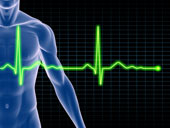
A low-carbohydrate diet, but not a low-fat diet, reduces inflammation in patients with type 2 diabetes, according to research at Linkpping University in Sweden....


A low-carbohydrate diet, but not a low-fat diet, reduces inflammation in patients with type 2 diabetes, according to research at Linkpping University in Sweden....

When Massachusetts enacted its own statewide health insurance reform in 2006, low-income women transitioned from receiving free, federally subsidized screening for breast and cervical cancer and......

New research published in Diabetologia (the journal of the European Association for the Study of Diabetes) indicates that brief bursts of intense exercise before meals (termed exercise 'snacking' by......
Calcium supplements are widely taken by women for bone health. Previous studies have suggested that calcium supplements may increase risk of cardiovascular disease, but the data has been inconsistent....

A new study by researchers at the Intermountain Medical Center Heart Institute in Salt Lake City has found that atrial fibrillation patients who are on blood thinning medications are at higher risk......

A study presented at Heart Rhythm 2014, the Heart Rhythm Society's 35th Annual Scientific Sessions, reports significant gender and health insurance disparities in implantable cardioverter......

A 20-year follow-up on an intensified insulin therapy trial in diabetic patients who suffered heart attacks finds that the treatment prolonged life by more than 2 years on average....

For the first time, a minimally invasive transcatheter valve has been shown to save more lives than open-heart surgery, according to new research. The research is part of a clinical trial that studied the Transcatheter Aortic Valve Replacement (TAVR) procedure, which uses a wired catheter to implant a self-expanding valve device through a small incision in the leg. The procedure is used to treat patients...

For the first time the protein Erbin has been shown to be an important brake that helps prevent pathological cardiac hypertrophy. Researchers showed that damage to this protein leads to excess growth of heart muscle, a decrease in function, and severe pathological growth of heart muscle. Their research has implications for breast cancer treatment, as Erbin interacts with the receptor Her2/ErBb2, which...

A study of Italians who consume a diet rich in resveratrol -- the compound found in red wine, dark chocolate and berries -- finds they live no longer than and are just as likely to develop cardiovascular disease or cancer as those who eat or drink smaller amounts of the antioxidant. ...
Scientists have merged stem cell and 'organ-on-a-chip' technologies to grow, for the first time, functioning human heart tissue carrying an inherited cardiovascular disease. The research appears to be a big step forward for personalized medicine, as it is working proof that a chunk of tissue containing a patient's specific genetic disorder can be replicated in the laboratory. ...
The power of genome-wide association studies (GWAS) to detect genetic influences on human disease can be substantially increased using a statistical testing framework reported in the May issue of the......

It is widely accepted that heart muscle cells in mammals stop replicating shortly after birth, limiting the ability of the heart to repair itself after injury....

A comparison of the genomes of polar bears and brown bears reveals that the polar bear is a much younger species than previously believed, having diverged from brown bears less than 500,000 years ago....

Calcium supplements are widely taken by women for bone health. Previous studies have suggested that calcium supplements may increase risk of cardiovascular disease, but the data has been inconsistent. A new study by researchers at Brigham and Women’s Hospital (BWH) did not find that calcium supplement intake increases risk of cardiovascular disease in women. The study is published online this month...

Atrial fibrillation patients who are on blood thinning medications are at higher risk of developing dementia if their doses are not in the optimal recommended range. ...

'Many heart attacks and strokes occur in individuals who do not appear to be at high risk,' researchers report following a recent study. 'Individuals with known CVD [cardiovascular disease] should take a daily aspirin, but the best approach for individuals without known CVD is unclear. If we only treat high-risk individuals with aspirin, we are going to miss a substantial portion of patients who eventually...

12-month follow-up data demonstrates that the world’s first leadless pacemaker is having overall device performance comparable to conventional pacemakers. The miniature-sized, leadless cardiac pacemaker is placed directly inside a patient's heart without surgery during a catheter-guided procedure through the groin via the femoral vein. The device, resembling a tiny, metal silver tube and smaller than...

A study of healthy senior men has found that 'relatively intensive' endurance exercise confers benefits on the heart irrespective of the age at which they began training. The benefits were evident and comparable in those who had started training before the age of 30 or after the age of 40. As a result, said the investigators, 40 is not too old to start endurance training. ...

High blood pressure is the greatest health risk worldwide behind smoking and alcohol consumption. Microsystems engineers and neurosurgeons have teamed up to develop a new cuff equipped with electrodes that can lower blood pressure without causing side effects. The scientists tested the device on rats and succeeded in lowering their mean blood pressure by 30 percent, without causing side effects such...